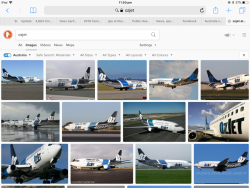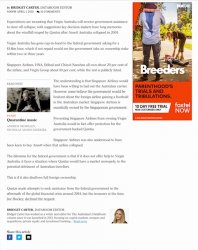The federal government is likely to facilitate the entry of a new carrier into the domestic market, rather than bail out Virgin Australia, should the struggling airline not survive the coronavirus crisis.
While the government would prefer that Virgin survived the economic crisis, it has no intention of acceding to the
airline's request for a $1.4 billion loan.
Senior government sources told
The Australian Financial Review that when the government insisted repeatedly that Australia must still have two strong airlines on the other side of the coronavirus catastrophe, that did not necessarily include Virgin.
It would not grant Virgin's wish for a $1.4 billion loan because it did not want to be saddled with an equity stake in a business that was already doing it tough before the virus crisis.
Neither did it want to create a precedent by stepping in to save a specific business.
"That is not our role,'' said a source.
"Do we want two strong airlines at the end of this? Yes, we do.
"But support can't be specific for one business. It must be systemic.
"There comes a time when the government can't run every business around the country.''
Should Virgin fail, the government would facilitate the entry of another carrier.
It is generally accepted that unless it secured extra capital, Virgin could burn through its cash reserves in three months. Rival Qantas could last for up to 11 months.
The government believed initial responsibility lay with two of Virgin's sovereign-backed co-owners, Singapore Airlines and Etihad.
So far, the government has announced about
$1 billion in general support for the aviation industry, which largely involves waiving of fees and taxes, some of which, such as fuel excise, they are not incurring because they are hardly flying.
It also said Virgin could draw on the
$1500-per-fortnight wage subsidies announced this week for workers who have either been stood down or who are still clinging on to their jobs at struggling companies.
As of 5pm on Wednesday, 452,236 businesses had applied for the subsidies under the $130 billion JobKeeper program. Parliament will sit on Wednesday next week to pass legislation for the program following an agreement struck between Scott Morrison and Anthony Albanese.
Virgin's cash position would improve with the JobKeeper allowance, and it was also seeking to improve liquidity by
pushing for rent relief from landlords.
Virgin's listed retail bonds, issued late last year to fund the partial buy-back of its loyalty division, are trading close to levels investors say are equivalent to a recovery rate if they were to default.
But should the airline fail, "steps will be taken to get another carrier to enter the market'', a government source said. "Barriers would be lowered.''
Australia already has one of the most liberal markets in the world when it comes to allowing foreign competitors in.
An entrant would have access to Virgin's infrastructure such as hangars and terminals. There would be a ready-made workforce from which to draw upon and it would be guaranteed take-off and landing slots.
Federal government approvals would be largely regulatory, said an industry source.
The source said that if Virgin did go under, a likely entrant would be British budget carrier Ryanair.
In recent days, Finance Minister Mathias Cormann and Trade and Tourism Minister Simon Birmingham have stressed the need for Australia to have two strong domestic airlines once the coronavirus crisis abated.
On top of the general measures announced so far, Senator Cormann signalled more industry help that may or may not save Virgin but he specifically ruled out a loan or other specific support.
"We do not take sides. We make judgments on an economy-wide and industry-wide basis. We do not pick winners,'' he said.
"We make judgments based on what is good policy. That is what we will continue to do here. We do want competition between two strong and viable airline businesses on the other side.
"What that will look like on the way through, we will have to see how that plays out.
"It is not our plan to take equity in an aviation business. But we are continuing to assess what appropriate supports, in a competitively neutral basis might be able to be provided moving forward."
Senator Birmingham has stated previously that "not having airlines in Australia is not negotiable for a country like us and would cripple our recovery''.


















